

2014 » April - June » Ten useful reports on MOOCs and online education. Team EDC. The Current State Of MOOCs. How MOOCs Are Being Used In Europe. One of the wonderful things about MOOCs is that they don’t force students to be in a particular location in order to ‘attend’ class.
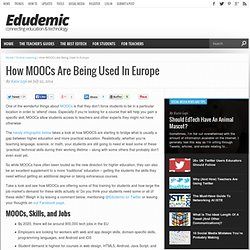
Especially if you’re looking for a course that will help you gain a specific skill, MOOCs allow students access to teachers and other experts they might not have otherwise. The handy infographic below takes a look at how MOOCS are starting to bridge what is usually a gap between higher education and more practical education. Realistically, whether you’re teaching language, science, or math, your students are still going to need at least some of these ‘practical’ technical skills during their working lifetime – along with some others that probably don’t even exist yet. So while MOOCs have often been touted as the new direction for higher education, they can also be an excellent supplement to a more ‘traditional’ education – getting the students the skills they need without getting an additional degree or taking extraneous courses.
Why c and x MOOCs are attracting different number of participants. MOOCs: Who’s using MOOCs? 10 different target audiences. Fascinating graphic,a sit shows that nearly 42% of the target audience for MOOCs are not the developed world.
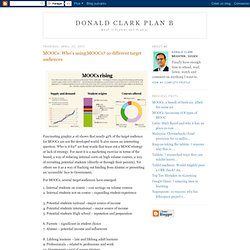
It also raises an interesting question. Will MOOC Technology Break the Education Cartel? Jonathan Nadler Part 1. The obligatory history lesson: It happened to the record industry first. While popular music had long been available on radio, it could be argued that a true music industry as we know it today didn’t arise until the 50‘s and 60‘s when distributable media and players became widely available.
To summarize – you bought your music on record, then on 8-track, then on cassette, and then on CD once again. Legal learning: how do MOOCs and copyright work? Another university has jumped on the Massive Open Online Course (MOOC) bandwagon this month, with the Australian National University joining up with Harvard venture edX.
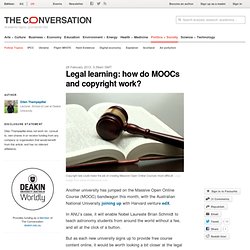
In ANU’s case, it will enable Nobel Laureate Brian Schmidt to teach astronomy students from around the world without a fee, and all at the click of a button. Massive List of MOOC Resources, Lit and Literati. A Quick Guide To The History Of MOOCs. This Is How Students Use School Websites 8.45K Views 0 Likes It's important to have a proper appearance online.
So why are there so many unhelpful school websites out there? This infographic shares what students want. Why TED Talks Have Become So Popular 5.67K Views 0 Likes TED talks are useful and free ways to bring high-level thinking and through-provoking ideas into the classroom and your home. 25 Tips to Make the Most of a MOOC. Massive online open courses (also known as MOOCs) are quite popular these days.
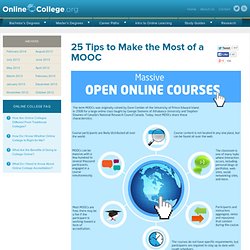
A huge, or massive, version of open online courses, these classes bring thousands together, often around the world, to learn simultaneously. Discussions, connections, and learning are the focus on MOOCs, but with the low level of commitment and their overwhelming nature, it’s easy to get disconnected. Read on, and we’ll share 25 ways to stay in the loop, on task, and get the most out of your MOOC experience. The MOOC Model: Challenging Traditional Education (EDUCAUSE Review. Key Takeaways A turning point will occur in the higher education model when a MOOC-based program of study leads to a degree from an accredited institution — a trend that has already begun to develop.
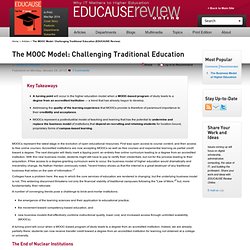
Addressing the quality of the learning experience that MOOCs provide is therefore of paramount importance to their credibility and acceptance. MOOCs represent a postindustrial model of teaching and learning that has the potential to undermine and replace the business model of institutions that depend on recruiting and retaining students for location-bound, proprietary forms of campus-based learning.
MOOCs represent the latest stage in the evolution of open educational resources. How NOT to Design a MOOC: The Disaster at Coursera and How to Fix it. I don’t usually like to title a post with negative connotations, but there is no way to put a positive spin on my experience with the MOOC I’m enrolled in through Coursera, Fundamentals of Online Education: Planning and Application.
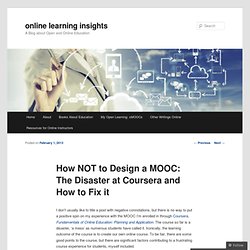
The course so far is a disaster, ‘a mess’ as numerous students have called it. Ironically, the learning outcome of the course is to create our own online course. With ePortfolio Evidence. C-Level View | Feature The Taming of the MOOC--With ePortfolio Evidence By Trent Batson01/16/13 The IT revolution that was supposed to transform higher education has failed to materialize, at least in the way we had imagined it.
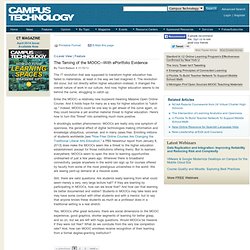
The revolution did occur, but not directly within higher education--instead, it changed the overall nature of work in our culture. And now, higher education seems to be behind the curve, struggling to catch up. Mooc_report-2013. Leading the #MOOC Discussion: 99 Twitters to Follow. A few weeks ago we published a list of websites covering all aspects of Massively Open Online Courses (MOOCs), Open Courseware (OCW), and general open education resources, and the response was amazing.
This is an incredibly important topic, and it is growing rapidly as the value of advanced education increases, and the technologies for distributing it get more advanced. One major benefit of MOOCs and OCW is that they provide unprecedented access to professional educational materials that may have been unaffordable or difficult to access for most people. Much of the discussion around this topic is happening in public forums online, and Twitter is a hotbed of conversation about MOOCs, OCW, and the overall increase of accessibility to education through digital media.
Anyone who cares about educational accessibility should check out the following Twitter accounts and see what they have to say on the subject. There are many sides to the MOOC discussion online. Why MOOCs are Good for Teacher Professional Development! While I am not a huge fan of MOOCs (see "MOOCs – The Opium of the Masses") I think that there is one area in which they might actually be extremely useful – ongoing teacher professional development (PD).
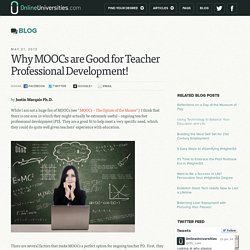
They are a good fit to help meet a very specific need, which they could do quite well given teachers’ experience with education. There are several factors that make MOOCs a perfect option for ongoing teacher PD. First, they are free, and schools are so strapped for funding that free anything is quite possibly the only option in many cases. Technology, Transparency & MOOCs.
MOOCs have introduced a greater level of transparency in online higher education.
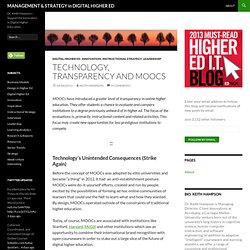
They offer students a chance to evaluate and compare institutions to a degree previously unheard of in higher ed. The focus of the evaluations is, primarily, instructional content and related activities. This focus may create new opportunities for less prestigious institutions to compete. Technology’s Unintended Consequences (Strike Again) Before the concept of MOOCs was adopted by elite universities and became “a thing” in 2012, it had an anti-establishment posture.
This may not be exactly what the people who started experimenting with MOOCs had in mind. Preparing for the second wave. Last Friday I was delighted have been invited to the “what are MOOCs?”
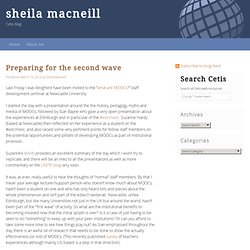
Staff development seminar at Newcastle University I started the day with a presentation around the the history, pedagogy, myths and media of MOOCs, followed by Sian Bayne who gave a very open presentation about the experiences at Edinburgh and in particular of the #edcmooc. The eLearning & Digital Cultures MOOC Pool. Transhumanist Declaration. Humanity stands to be profoundly affected by science and technology in the future.
We envision the possibility of broadening human potential by overcoming aging, cognitive shortcomings, involuntary suffering, and our confinement to planet Earth.We believe that humanity’s potential is still mostly unrealized. There are possible scenarios that lead to wonderful and exceedingly worthwhile enhanced human conditions.We recognize that humanity faces serious risks, especially from the misuse of new technologies. There are possible realistic scenarios that lead to the loss of most, or even all, of what we hold valuable. Some of these scenarios are drastic, others are subtle. Although all progress is change, not all change is progress.Research effort needs to be invested into understanding these prospects.
Transhumanist Values. 1. Edcmooc_artefact. E-Learning and Digital Cultures MOOC. A Tale of Two MOOCs @ Coursera: Divided by Pedagogy. The Web as a classroom is transforming how people learn, is driving the need for new pedagogy; two recently launched courses at Coursera highlight what happens when pedagogical methods fail to adapt. Divided pedagogy. Professor Leaves a MOOC in Mid-Course in Dispute Over Teaching - Wired Campus. Teaching 'E-learning and Digital Cultures'